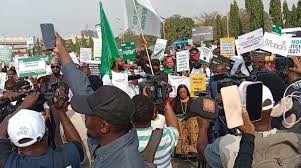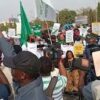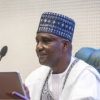Caption: Image ChatGPT Claim: An online post accuses President Bola Ahmed Tinubu of hypocrisy, alleging that he opposed a fuel tax as “double taxation” in 2003 but plans to reintroduce it in 2025 as part of “tax harmonisation.” Verdict: True. In 2003, Tinubu opposed the federal government’s fuel tax, stating that it was “unconstitutional”
Caption: Image ChatGPT
Claim: An online post accuses President Bola Ahmed Tinubu of hypocrisy, alleging that he opposed a fuel tax as “double taxation” in 2003 but plans to reintroduce it in 2025 as part of “tax harmonisation.”
Verdict: True. In 2003, Tinubu opposed the federal government’s fuel tax, stating that it was “unconstitutional” and amounted to “double taxation”.
Full Text
On September 6, 2025, X user @Prince_Alinko claimed that President Ahmed Tinubu opposed the fuel tax during the tenure of former President Obasanjo in 2003. In his post, he quoted “All these grammatical errors can’t erase Tinubu’s hypocrisy. In 2003, he referred to the fuel tax as double taxation. In 2025, he smuggles the same tax into law, hiding behind the guise of harmonisation. Whether it’s new or restated, it means more hardship for Nigerians. Stop packaging suffering as reform, at the end of the day, it’s more tax on poverty. Hypocrisy on steroids.”
President Tinubu recently approved a 5% fuel tax, effective January 2026, in accordance with the “Harmonised Tax Act”. Under this law, buyers will pay an extra ₦500 for every ₦10,000 spent on fuel, with the surcharge applied to all refined fossil fuels sold in Nigeria, whether domestic or imported. Exemptions include renewables, household kerosene, LPG, and CNG.
NDRFactCheck investigated this claim because it questions President Tinubu’s consistency on fuel taxation and has gone viral online, here, here, and here. With the significant economic effects of the new 5% fuel tax, it is essential to verify current and past positions for public accountability.
Verification
In a research conducted by NDRFactCheck in December 2003, President Bola Ahmed Tinubu, then Governor of Lagos State, publicly opposed the federal government’s proposed fuel tax, branding it “double taxation” and pledging to challenge its legality in court. Tinubu argued that the fuel tax was unconstitutional, imposing an unfair fiscal burden on Nigerians already taxed at multiple points.
The proposed levy, intended to fund the Federal Road Maintenance Agency (FERMA), for the maintenance of roads, sparked significant backlash from Tinubu and several state governors who viewed it as excessive and unjust. Tinubu urged resistance, asserting that fuel tax authority rested only with the state governments and that imposing an additional federal tax amounted to economic oppression of the citizenry.
In another research, historical records show that Bola Ahmed Tinubu, then a prominent figure in the Alliance for Democracy (AD) and Governor of Lagos State, openly criticised the federal government’s proposed fuel tax, describing it as an unnecessary burden on Nigerians. Tinubu took a notable position in Lagos, where a state-level consumption tax had already been implemented. Although there was no major court case directly contesting the 2003 fuel tax, his statement about potential legal action was consistent with his past actions regarding President Olusegun Obasanjo’s policies, including his Supreme Court case concerning the withholding of local government funds.
Conclusion
President Bola Tinubu opposed a fuel tax in 2003, citing double taxation, but in 2025 approved a new 5% fuel tax under the Harmonised Tax Act. While this shift appears hypocritical, the government claims the new tax is part of broader reforms rather than a repeat of earlier proposals.




















